MUSINGS FROM PRASANTHI NILAYAM
CONCERNING THE VEDAS - 04
CONCERNING THE VEDAS - 04
UNDERSTANDING PURUSHA SUKHTAM
Previous Articles In The Same Series | ||||||||
|
|
| ||||||
Loving Sai Ram and greetings from Prashanti Nilayam,
I hope you recall that my main aim in this series of talks on the Vedas is to first give you a broad flavour of what this great heritage of humanity is all about, and then move on to a description of how, in olden times, the Vedas kept company with man during his life. As a part of this programme, I offered in the first two talks a general introduction of sorts and in the third one, that is my previous talk, I gave you a glimpse of the famous Taitrriya Upanishad.
In the same spirit I shall, in my present talk, offer a short overview of the equally famous Purusha Shukhtam. The Taitrriya Upanishad and the PurushaSukhtam are but mere samples. There are many other examples that could have been chosen, but one reason why I have focused on these two is that they are heard very often in Prashanti Nilayam. Moreover, Radio Sai has already presented an elaborate series on these two favourites and I thought maybe by locking on to these two I might be able to connect more easily with you on the subject of the Vedas.
The Meaning Of ‘Purusha Shukhtam’
Now what exactly is a Sukhtam? Very simply put, the word Sukhtam means a good word. Thus, PurushaSuktham means: in praise of Purusha – that is what this wonderful hymn with twenty-four stanzas is all about. This of course raises the questions: Who exactly is this Purusha and why are His praises being sung? Purusha is none other than the Supreme Lord Who, it turns out, is known by many names. In this particular Sukhtam the term Purusha is the name that is most often used. As Krishna explains to Arjuna in the BhagavadGita, in the ultimate analysis God is Formless, Absolute and beyond both Space as well as Time.
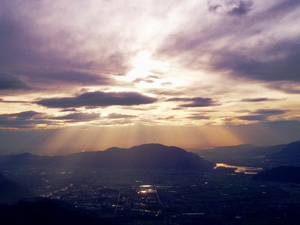 Purusha is one name for this Formless and Abstract God. There are of course many other names like Paramatma, Brahman, Parabrahman and so on. Call Him by any name including Allah, Jehovah or whatever, the fact of the matter is that God Supreme, whom I am currently referring to as Purusha, is Infinite, Timeless, Eternal, Changeless, etc., etc.
Purusha is one name for this Formless and Abstract God. There are of course many other names like Paramatma, Brahman, Parabrahman and so on. Call Him by any name including Allah, Jehovah or whatever, the fact of the matter is that God Supreme, whom I am currently referring to as Purusha, is Infinite, Timeless, Eternal, Changeless, etc., etc. The above statement might immediately create a doubt. If the Lord Supreme, namely Purusha, is so “remote”, then what does it mean when Swami says: “I am in you, above you, below you, ahead of you, behind you”? The answer to this is simple.
Though the Supreme Lord is supposed to live in His Eternal Abode beyond Space and Time, He has also projected Himself into the finite Universe to appear in various forms. In this sense, He also pervades the Universe.
Thus, God is both above Creation and also below it. Above Creation He is in an Absolute State. OK, but what about below Creation? The Lord in His Avatar as Krishna has clearly explained that.
All Is God
Krishna says that in Creation, God is both Unmanifest as well as Manifest. The manifest aspect is easier to understand. In brief, it means that everything that is a part of the physical universe is, in the ultimate analysis, God and nothing but God. Thus, if you go to the very roots, the wind is God, trees are God, mountains are God, rivers are God, a crow is God, a vulture is God, and so on. You name it and it is God! Sounds extraordinary, does it not? Yet, if we think about it carefully, we cannot escape that conclusion.
The Power Of God
Hardcore non-believers of today would shake their heads at all this and smile, perhaps condescendingly. “What nonsense”, they would exclaim. “How can the wind be God?” Let us hear what Swami has to say about the wind. He sometimes asks in His Discourses: “Has man made any fan that can blow as fiercely as a typhoon or a hurricane?” Those are not His exact words, but they convey the gist of His remark.
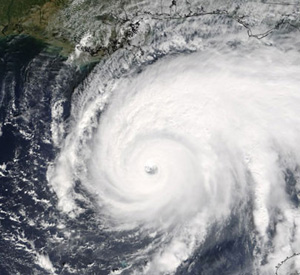 Just pause for a moment and reflect. How many of us realise that during a typhoon wind speeds touch 250 km/hour, yes 250 km/hour? Do you know that a category four hurricane – and these do sweep across the Atlantic from time to time – is as big as the state of Texas, that it not only brings nearly half a metre of rain, that is, 500 mm of rain, and that even at the periphery of this typhoon the wind speed is about 60 km/hour? As Swami asks: “Has man made a blower that can generate that kind of air speeds and that too over such vast areas?” That is the real point; where can such power come from except God?
Just pause for a moment and reflect. How many of us realise that during a typhoon wind speeds touch 250 km/hour, yes 250 km/hour? Do you know that a category four hurricane – and these do sweep across the Atlantic from time to time – is as big as the state of Texas, that it not only brings nearly half a metre of rain, that is, 500 mm of rain, and that even at the periphery of this typhoon the wind speed is about 60 km/hour? As Swami asks: “Has man made a blower that can generate that kind of air speeds and that too over such vast areas?” That is the real point; where can such power come from except God? Let us now swing to the other extreme and consider the crow. Ancients in India revered the crow. They were not crazy but deeply appreciative of the fine balance in God’s extraordinary Master Plan. How many realise that the unimpressive and somewhat ugly-looking crow is actually Nature’s scavenger? Throw perishables and the crow comes from somewhere to eat it all! Ancient Indians revered the crow because they saw God in the crow coming to their help.
Nature's Intricate Balance
If we look carefully, every little thing in Nature, right from the plankton upwards, plays a delicate role in preserving the integrity and balance of Nature. Take the fish. As Swami says, the fish cleans up the waters including the great oceans. But what does man do? First, he pollutes the waters and then he destroys fish stock almost en masse.
So, if we choose to think about all this carefully and objectively, it should be abundantly clear that Nature does have a carefully-crafted Master Plan in which there are many players, big and small, each with its own unique role to play. Although these players may appear to us with various forms, in the ultimate analysis all roles are in fact played by God.
We may not understand all of it but that does not mean that the Master Plan and the Cosmic Drama do not exist. The non-believer might perhaps reluctantly concede that there is possibly some kind of a plan, but at the same time argue that the existence of a plan does not mean that there is a guiding spirit behind it. The ancients of India had no use for such evasive and meaningless arguments. They freely accepted, and with much joy too, that there was a Lord Supreme and that not even an atom could move without His Grace or He willing it.
In a nutshell, the Vedas loudly proclaim that God is everywhere and in everything, from the tiny ant to the galaxies. This, incidentally, is a phrase that Swami often quotes – Kshimalo Brahmalo. In other words, God is present everywhere in the manifest or the material world, from the ant to the galaxies. But what about the Unmanifest presence of God in Creation? That also is not difficult to understand, at least in principle.
The Unmanifest Presence Of God
Scholars discuss the Omnipresence of God using three important words. They are: Immanent, Transcendent, and Absolute. In the Universe, God is both Immanent and Transcendent; His Absolute aspect extends even beyond the Universe. Let us take in all this slowly.
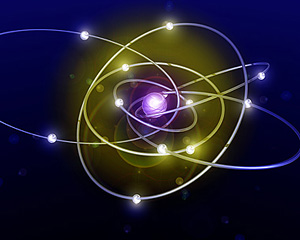 What do I mean by saying God is immanent in the Universe? Let us take the physical Universe. I am a physicist by training and I have written many books explaining how physical laws operate in the Universe. When it comes to the atom, with relativity, quantum mechanics and electromagnetism we can more or less completely describe all the properties of the atom. All these predictions of science have been meticulously verified and, in fact, many have won the Nobel Prize for doing just that. The point about all this is that we can explain physical behaviour using the laws of science alone, without explicitly bringing God into the discussion.
What do I mean by saying God is immanent in the Universe? Let us take the physical Universe. I am a physicist by training and I have written many books explaining how physical laws operate in the Universe. When it comes to the atom, with relativity, quantum mechanics and electromagnetism we can more or less completely describe all the properties of the atom. All these predictions of science have been meticulously verified and, in fact, many have won the Nobel Prize for doing just that. The point about all this is that we can explain physical behaviour using the laws of science alone, without explicitly bringing God into the discussion.Fine, does that mean that God does not exist? Atheists would of course argue that God is not necessary, God is irrelevant, etc. But the wise would say, “Yes, the Dirac equation and its extension in the form of quantum electrodynamics by Feynman explains a lot of natural phenomena no doubt, but where did the laws of relativity, the laws of electrodynamics and the laws of quantum mechanics pop from? God is immanent in all these beautiful laws.”
Gandhi once said:
There is an indefinable mysterious Power that pervades everything. I feel it, though I cannot see it.
Gandhi was merely saying God is immanent in the Universe, in every atom of it in fact.
OK, agreed that God is immanent in the Universe. What about the Transcendent part? Well, the way I understand it is as follows – by the way, my view is shaped by what Krishna says in the eighth chapter of the Gita. Let us consider a living human being or for that matter even an ant. I find the ant absolutely amazing. Incidentally, the brilliant physicist Feynman did too, and he once spent days studying their behaviour. At the chemical or biological level, the ant is just a collection of biomolecules of various types. But this collection can do amazing things. It can move and also react to situations.
Let us say an ant is moving on the ground. Place a small piece of paper across its path. It immediately reacts and moves away. If the ant senses danger, it tries to protect itself. In short, it is aware it exists, it is conscious of its existence. That awareness, that consciousness of being alive, is a capacity, a power that is beyond the power described by the laws of physics, chemistry or even biology. The laws of physics are mere mechanical laws. Till today, Science has simply not been able to say what life is, what awareness is, and what consciousness is; and yet life, awareness and consciousness do exist – we all know that. That life-force or Praana as the ancients called it is the transcendent aspect of God. There are many such arguments I can give, but shall skip them for the moment.
Turning next to the Absolute aspect of God, even this is evident on earth. Consider a human being full of Daya or compassion and Kshama or forbearance. Daya and Kshama are eternal virtues, beyond Space and Time; and they are aspects of the Supreme God or Purusha. When they shine in a human being, they represent in some measure the presence of the Absolute within, what Krishna refers to as Adhyatma.
A Summary Of The Above
So the long and short of it is that in the Universe or if we prefer in Creation, there is the manifest aspect of God and also the Unmanifest aspect of God. Purusha Sukhtam draws attention to all this as did Krishna later, with much clarity I might add. Putting everything together, we have the following picture.
| 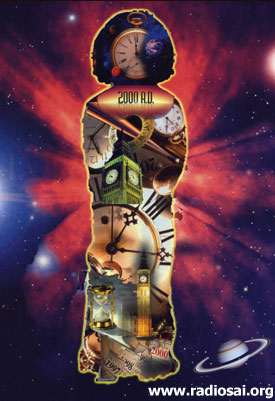 |
What PurushaSukhtam does is to not only crisply call attention to all this but also paint an allegorical and poetic picture of evolution itself. To put it in slightly different words, the PurushaSukhtam gives a poetic description of God, man, the Universe and the relationship between all these three.
The doubt might arise, "When God projects Himself into lower dimensions to create the Universe, does His quantum at the Absolute level get diminished?" The answer is simple and straightforward. God is Infinity, and nothing can diminish Infinity. That incidentally is one way in which the concept of infinity is taught to students of mathematics – Infinity minus Infinity remains Infinity.
The Text Of The PurushaSukhtam
So much for the preliminaries. Let me now turn to the PurushaSukhtam proper. I shall not discuss the poetic and allegorical description it offers of Creation. Instead, I shall focus on the very first sentence.
Sahasraseerusha Purushaha. Sharaksha saharsrapaad.
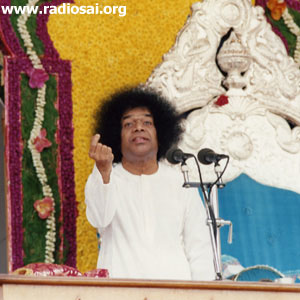 What this means is that Purusha the Supreme One pervades the entire manifest Universe, cognising through all minds, seeing through all eyes, and working through all limbs. He is everywhere. Where is He not? Enveloping the Universe from all sides, He also transcends it, into the infinite, intangible and Eternal Realm of the Absolute. That is the gist of the opening stanza.
What this means is that Purusha the Supreme One pervades the entire manifest Universe, cognising through all minds, seeing through all eyes, and working through all limbs. He is everywhere. Where is He not? Enveloping the Universe from all sides, He also transcends it, into the infinite, intangible and Eternal Realm of the Absolute. That is the gist of the opening stanza. You might ask: what is the meaning of saying, for example, God sees through all eyes? The best way of discussing this point is to recall what happened many years ago during a Discourse given by Swami in the Sai Kulwant Hall.
A devotee speaking in the Divine presence and just before the Divine Discourse, raised the question: “Who is God?” When it was Swami’s turn to speak, He said that such questions arise from ignorance because there is only God and nothing but God. Swami added, “People ask, ‘if there is only God, then why don’t we see Him?’ You do not see God because you have curious notions about how God ought to look. God is in everything including all human beings. When the Vedas say that He has a thousand eyes, it does not mean that God is an entity with a thousand eyes. In fact, any form with a thousand eyes would look grotesque. What it means is that God sees through all eyes because He resides in all. In other words, man must look upon Society as God.”
"People may ask, in that case why do the Vedas speak of only a thousand eyes? The answer is simple. In those distant days, the population of the world was small and people thought in terms of thousands and not millions as we now do. If those Rishis were to describe God today in that language, they would speak of billions and not thousands!" That is what Swami said in essence and that observation of Swami ought to make clear how we ought to interpret this opening stanza.
We Are All Connected
I now wish to follow up on this first stanza because it has a deep meaning and implication for the present time. As a prelude, allow me to draw attention to a hierarchy to which Swami sometimes makes a reference. The hierarchy is: Individual, Society, Nature and God. The words Swami actually uses are: Vyashti meaning individual, Samashti meaning Society, Srishti, meaning Creation or Nature, whichever term you prefer, and finally Parameshti meaning God.
 Swami goes on to add that the individual is a limb of Society which is a limb of Nature which in turn is a limb of God. In turn, this hierarchical relationship implies that every action of the individual must be in harmony with Society, Nature and God. Take a simple example. When one throws litter and garbage, one is causing disturbance to Society, one is polluting the environment, and finally one is out of sync with God who is the Embodiment of Perfection. The hierarchy drawn attention to by Swami is thus profoundly significant.
Swami goes on to add that the individual is a limb of Society which is a limb of Nature which in turn is a limb of God. In turn, this hierarchical relationship implies that every action of the individual must be in harmony with Society, Nature and God. Take a simple example. When one throws litter and garbage, one is causing disturbance to Society, one is polluting the environment, and finally one is out of sync with God who is the Embodiment of Perfection. The hierarchy drawn attention to by Swami is thus profoundly significant.The point being made by Swami is far from trivial. Today, the world is highly interconnected, thanks to air travel, satellite TV, internet, mobile phone, etc. Events happening in one place can affect thousands elsewhere within twenty-four hours. For example, say the OPEC or the group that coordinates the oil pricing policies of the petroleum exporting countries meets in Vienna and decides to cut down pumping oil from the ground.
Immediately the price of crude shoots up in the New York and London markets. Worldwide, the price of petrol shoots up and the people in, for example, Uganda, a poor country in Africa, are affected. Why? Because the cost of transportation goes up for them. As it is they are hard pressed for cash and if on top of it the transportation costs go up, the price of everything else goes up too.
Take SARS next. Farmers in Thailand and Vietnam have huge poultry farms where, say, a bird flu epidemic breaks out. A farmer who looks after the chicken gets infected and from him the flu spreads to Canada, France and so on. By the way, all this has happened. What I am driving at through these examples is that global connectivity has created a situation where an action by an individual can and does affect people elsewhere; besides, it can also harm the environment. The impact on Society can be in many dimensions, economic, material and even moral. Likewise, the impact on Nature can be diverse. Not only individuals but big companies, via the policies they pursue, also contribute to such global impact.
Let me give just one example of the latter. Driven by the desire to make lots of money, big corporations are today fuelling unwanted and excessive consumption of fast foods and soft drinks. In turn, this harms the health of huge sections of the population. Some types of consumerism promote pollution of Nature. Thus there is pollution of air, water and land. In addition, greed eclipses the fear of sin and makes people forget God, compounding the problem. If all this is to be avoided, then one must pay careful attention to the content and spirit of PurushaSukhtam, imbibe its teachings, and apply them sincerely in one’s daily life.
Times and lifestyles might have changed, but these changes do not make the basic lessons of spirituality irrelevant. On the contrary, they are more relevant to mankind then ever before. By the way, let us not imagine that big corporations and rich people alone violate moral laws; if we enquire deeply, every one of us is guilty in some way or the other. So, really speaking, we should first fix ourselves and overcome our own personal deficiencies before pointing fingers at others. As Swami reminds us, when we point one finger at others, three of our fingers are actually pointing to us.
People these days imagine that devotion for God is one thing and life is another. It is understandable if people elsewhere take such an attitude but the surprising thing is that even Swami’s devotees tend to do this. Thus, while overflowing with Love for Swami in His physical form, they fail to see Him pervade Society and Nature. This can be dangerous because unconsciously perhaps they might tend to do things that are detrimental to Society and/or harmful to Nature.
The Ancient Sages Warned Modern Man
 The Vedic culture shaped man in such a way that his lifestyle made him in tune with Society and in harmony with Nature. The Purusha Sukhtam taught man that God not only created Society but also pervades it. And this, thousands of years before man had any chance of making a global physical impact, positive or otherwise. When we reflect on this, we would see how wise the Vedic seers were to encourage man to lead a harmonious life .
The Vedic culture shaped man in such a way that his lifestyle made him in tune with Society and in harmony with Nature. The Purusha Sukhtam taught man that God not only created Society but also pervades it. And this, thousands of years before man had any chance of making a global physical impact, positive or otherwise. When we reflect on this, we would see how wise the Vedic seers were to encourage man to lead a harmonious life . Today, more than ever before, such harmonious living is a vital necessity when greedy individuals are dumping termites at the moral roots of Society through the media, while equally greedy corporations are encouraging unwanted consumerism, even though non-spiritual think tanks have warned against it. For example, just a few weeks ago, one of the think tanks set up by the UN, submitted a preliminary report on the ecosystem. It drew attention to the fact that some systems were damaged beyond repair while many others faced extinction, unless urgent control action was taken. When we consider all such facts in conjunction with Vedic thought, we have to take our hats off and salute those in far off days who had the wisdom to see what could come thousands of years later.
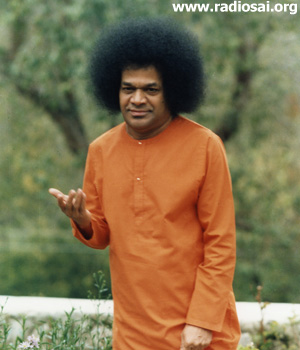 As Swami says, modern man is very intelligent in worldly matters. He has extraordinary skills to do so many wonderful things. But he lacks balance; that balance comes from inside and when the inside is shut out, there can be serious trouble.
As Swami says, modern man is very intelligent in worldly matters. He has extraordinary skills to do so many wonderful things. But he lacks balance; that balance comes from inside and when the inside is shut out, there can be serious trouble. Let me put it all this way. Imaging a burning ship, a big ship like say the Queen Elizabeth. The passengers in the ship can in principle be rescued using lifeboats. But the situation faced by mankind today is not at all like that. The planet is a spaceship, making its own journey in space, and each and every one of us is a passenger on this ship. This is one ship that has no lifeboat service of the usual kind. If anything terrible were to happen to the planet, like the greenhouse effect, for example, everyone would be in trouble.
Trouble is what we see everywhere and it cannot be swept under the rug. We have to eliminate or at least mitigate these problems, and for that there is only one way – to return to Moral Law. To use Swami’s words, we need Daiva Preeti, and Paapa Bheeti – Love for God and fear of sin. Only then will there be morality in Society. Morality is the only lifeboat that can save us, and to make that boat show up, each and every one of us must develop deep and true Love for God and a mortal fear of sin.
We can’t come here for Darshan and then head straight to the casinos in Monaco or the gambling dens in Las Vegas. As Jesus said, we have to choose either God or Mammon. One cannot serve two Masters at the same time. It is in that context that the Universal Truths that the Vedas enshrine become very relevant. I wonder whether you would agree with me?
Click here to listen a rendering of Purusha Sukhtam [5.5 MB]
Jai Sai Ram.
– Heart2Heart Team














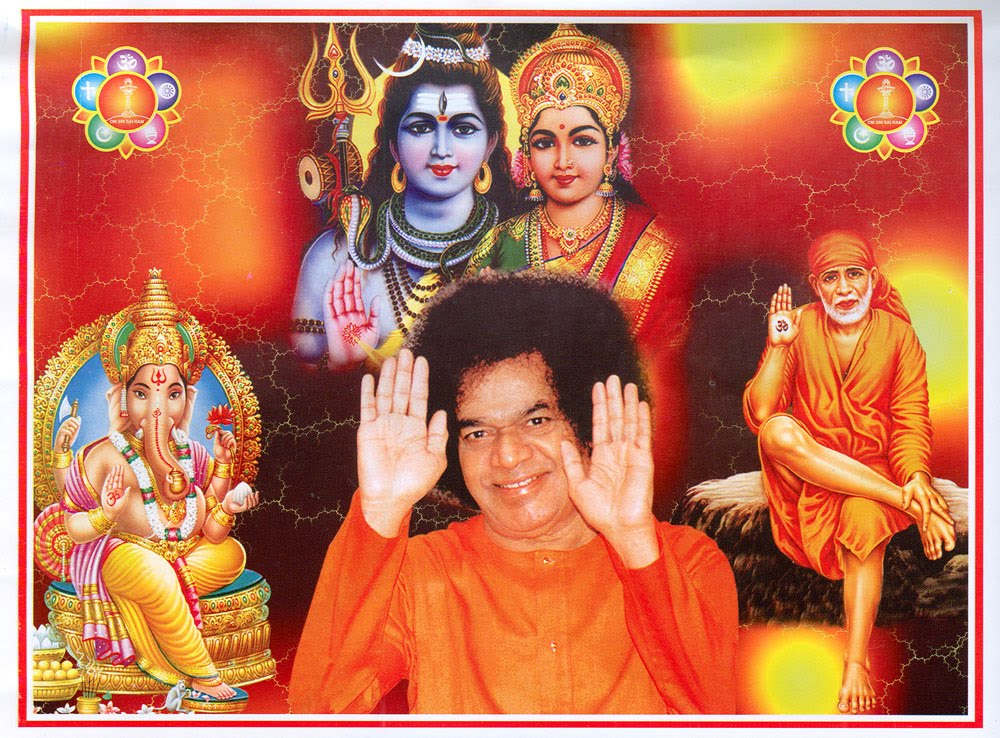






No hay comentarios :
Publicar un comentario